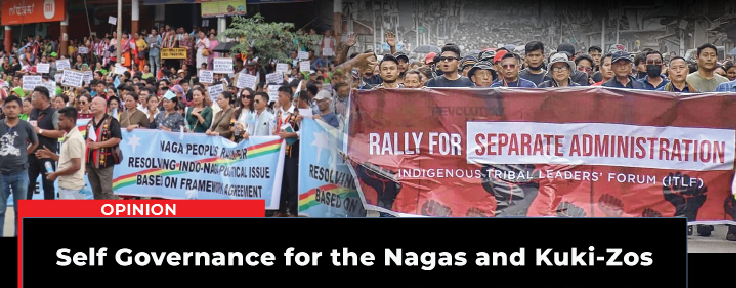
Ngaranmi Shimray (Is it the Opportune Time for Nagas to Demand for a Sixth Schedule… Ukhrul Times, 31 July 2024) has written an article on the issue of self-governance that is close to the hearts of the tribal people in Manipur. He has referred to Article 371-C of the Constitution with special provisions under the Hill Areas Committee (HAC) and has clearly identified the shortcomings - not owing to the provisions, but on account of the state government and the Speaker of the Manipur Legislative Assembly. To plug loopholes, Shimray has mooted the question of an opportune time for Naga to consider the Sixth-Schedule. Ironically, the Kuki Zo people no longer share the same aspiration because they do not enjoy the benefits of being spared the experience of ethnic cleansing from 3 May 2023.
The stance taken by the state Government, dominated by the Meitei valley people of Manipur, is intrinsic to the issue of land. Any form of self-governance for tribal people is anathema, as it impinges on their exclusivist territorial notion of Manipur. This view is also corroborated by Capt (rtd) LB Singh’s ‘Article 371-C aggravates ethnic divide and stalls progress of Manipur’ (The Sangai Express, 12 Feb 2024).
Reported interactions related to self-governance between representatives of GoI and various components of Naga and Kuki Zo communities, with respect to Manipur, suggests Government would be more receptive to the Sixth-Schedule option. However, relegation of HAC and atrocity inflicted upon select community are summary evidence that the valley people will not welcome the Sixth-Schedule, which is explicit re protection of tribal land rights.
A worrying issue is land. To resolve this factor between Naga and Kuki Zo, Shimray has delineated three types of inhabited areas: two, with preponderance, respectively of Naga and Kuki Zo, and one, inhabited by both tribes. The Constitution provides the structural viability of administration of the tribes in the existing six Autonomous District Councils, albeit demonstrably lacking essential devolution of power. However, given the condition of Kuki Zo post-3 May 2023, there is need for an appropriate administrative alternative with Constitutional safeguards that also addresses the land factor concerning both communities.
Constitutional safeguards and administrative structure
With respect to areas inhabited by Naga and Kuki Zo, Shimray echoes a similar sentiment to the Naga Intellectual Forum’s article circulated in social media, ‘When Opportunity Come Knocking; Seize It: Challenges Ahead for Nagas of Manipur’. The premise of both is an administrative arrangement, which maintains the sanctity of the respective habitation of Naga and Kuki Zo. The Naga Intellectual Forum’s article refers to the Union Territory of Puducherry with legislature, comprising four districts surrounded within three different states: two by Tamil Nadu, and one each by Andhra Pradesh and Kerala. The four non-contiguous districts are a single administrative entity with headquarters at Puducherry.
Each of the eight existing Union Territories in the country is unique. Article 239A of the Indian Constitution, which deals with creation of local legislatures or Council of Ministers can fulfil the long-standing aspirations of Naga and Kuki Zo. In the existing political environment, Government will be better disposed to a simultaneous solution.
Given the implications of the valley people’s exclusivist notion of Manipur territory, whether it be Article 371C, Sixth-Schedule, Autonomous District Councils, Autonomous Territorial Councils or Union Territory, co-operation from the dominant Meitei community of the state cannot be expected. Precedence exists. Owing to opposition from the same community, the Centre did not follow through on the Supreme Court delimitations order concerning representation in the Legislative Assembly. Naga and Kuki Zo political aspirations of self-governance will continue to face similar opposition.
For Kuki Zo in particular, who do not share cordial relations as Naga and Meitei, there is no alternative to UT. Securing our existential future is paramount. Article 371C, Sixth-Schedule, Autonomous District Councils or Autonomous Territorial Councils are all water under the bridge.

Thingkho Le Malcha (TLM) is a traditional method of communication used to send out messages across the Kuki hills during the Anglo-Kuki War,1917-1919... more

If you would like to received a free softcopy of Thingkho le Malcha, you can follow our Whatsapp and Telegram by clicking the below links.
For any other media related you can contact us using below email